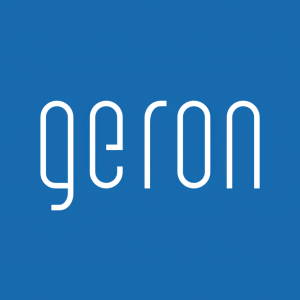Geron Announces Updated NCCN Guidelines® Recommending RYTELO™ (imetelstat) for the Treatment of Symptomatic Anemia in Patients with Lower-Risk MDS
RYTELO, for both RS+ and RS- patients, has a Category 1 recommendation for second-line treatment and a Category 2A recommendation for first-line treatment of patients who are ESA ineligible (serum EPO >500 mU/mL)
The MDS NCCN Guidelines categorize lower-risk MDS patients without the del(5q) abnormality and with symptomatic anemia on the basis of ring sideroblasts (RS) percentage and serum EPO levels, without specifying red blood cell transfusion burden. For RS- lower-risk MDS patients with symptomatic anemia, RYTELO is recommended as a Category 1 second-line treatment after either erythropoiesis-stimulating agents (ESAs) or luspatercept in patients with serum EPO ≤500 mU/mL, and as a Category 2A first-line treatment in patients with serum EPO >500 mU/mL and unlikely to respond to immunosuppressive therapy. For RS+ lower-risk MDS patients with symptomatic anemia, RYTELO is recommended as a Category 1 second-line treatment after luspatercept in patients with serum EPO ≤500 mU/mL, and as a Category 2A first-line treatment in patients with serum EPO >500 mU/mL.
“We believe that the placement of RYTELO in the updated MDS NCCN Guidelines reflects the strength of our Phase 3 data and the
These updates to the MDS NCCN Guidelines follow the
National Comprehensive Cancer Network® (NCCN®) is a well-recognized, not-for-profit alliance of leading cancer centers in
About Lower-Risk Myelodysplastic Syndromes (LR-MDS)
Lower-risk myelodysplastic syndromes (LR-MDS) is a blood cancer that often progresses to require increasingly intensified management of key symptoms such as anemia and resulting fatigue1. These symptomatic LR-MDS patients frequently become red blood cell transfusion dependent, which has been shown to be associated with short- and long-term clinical consequences that reduce quality of life and shorten survival2,3. There is a high unmet need for many LR-MDS patients, particularly those with characteristics having poorer prognosis. Current treatment options for those failing ESA are limited to select sub-populations and there is an unmet need for treatments that can provide extended and continuous red blood cell transfusion independence.
About RYTELO™ (imetelstat)
RYTELO™ (imetelstat) is an FDA-approved oligonucleotide telomerase inhibitor for the treatment of adult patients with low-to-intermediate-1 risk myelodysplastic syndromes (LR-MDS) with transfusion-dependent anemia requiring four or more red blood cell units over eight weeks who have not responded to or have lost response to or are ineligible for erythropoiesis-stimulating agents (ESAs). It is indicated to be administered as an intravenous infusion over two hours every four weeks.
RYTELO is a first-in-class treatment that works by inhibiting telomerase enzymatic activity. Telomeres are protective caps at the end of chromosomes that naturally shorten each time a cell divides. In LR-MDS, abnormal bone marrow cells often express the enzyme telomerase, which rebuilds those telomeres, allowing for uncontrolled cell division. Developed and exclusively owned by Geron, RYTELO is the first and only telomerase inhibitor approved by the
Geron aims to ensure broad access to RYTELO for eligible patients. Accordingly, our REACH4RYTELO™ Patient Support Program provides a range of resources that support access and affordability to eligible patients prescribed RYTELO.
IMPORTANT SAFETY INFORMATION
WARNINGS AND PRECAUTIONS
Thrombocytopenia
RYTELO can cause thrombocytopenia based on laboratory values. In the clinical trial, new or worsening Grade 3 or 4 decreased platelets occurred in
Monitor patients with thrombocytopenia for bleeding. Monitor complete blood cell counts prior to initiation of RYTELO, weekly for the first two cycles, prior to each cycle thereafter, and as clinically indicated. Administer platelet transfusions as appropriate. Delay the next cycle and resume at the same or reduced dose, or discontinue as recommended.
Neutropenia
RYTELO can cause neutropenia based on laboratory values. In the clinical trial, new or worsening Grade 3 or 4 decreased neutrophils occurred in
Monitor patients with Grade 3 or 4 neutropenia for infections, including sepsis. Monitor complete blood cell counts prior to initiation of RYTELO, weekly for the first two cycles, prior to each cycle thereafter, and as clinically indicated. Administer growth factors and anti-infective therapies for treatment or prophylaxis as appropriate. Delay the next cycle and resume at the same or reduced dose, or discontinue as recommended.
Infusion-Related Reactions
RYTELO can cause infusion-related reactions. In the clinical trial, infusion-related reactions occurred in
Premedicate patients at least 30 minutes prior to infusion with diphenhydramine and hydrocortisone as recommended and monitor patients for one hour following the infusion as recommended. Manage symptoms of infusion-related reactions with supportive care and infusion interruptions, decrease infusion rate, or permanently discontinue as recommended.
Embryo-Fetal Toxicity
RYTELO can cause embryo-fetal harm when administered to a pregnant woman. Advise pregnant women of the potential risk to a fetus. Advise females of reproductive potential to use effective contraception during treatment with RYTELO and for 1 week after the last dose.
ADVERSE REACTIONS
Serious adverse reactions occurred in
Most common adverse reactions (≥
Please see RYTELO (imetelstat) full Prescribing Information, including Medication Guide, available at https://pi.geron.com/products/US/pi/rytelo_pi.pdf.
About Geron
Geron is a commercial-stage biopharmaceutical company aiming to change lives by changing the course of blood cancer. Our first-in-class telomerase inhibitor RYTELO™ (imetelstat) is FDA-approved for the treatment of adult patients with lower-risk MDS with transfusion dependent anemia. We are also conducting a pivotal Phase 3 clinical trial of imetelstat in JAK-inhibitor relapsed/refractory myelofibrosis (R/R MF), as well as studies in other hematologic malignancies. Inhibiting telomerase activity, which is increased in malignant stem and progenitor cells in the bone marrow, aims to potentially reduce proliferation and induce death of malignant cells. To learn more, visit www.geron.com or follow us on LinkedIn.
Use of Forward-Looking Statements
Except for the historical information contained herein, this press release contains forward-looking statements made pursuant to the “safe harbor” provisions of the Private Securities Litigation Reform Act of 1995. Investors are cautioned that such statements, include, without limitation, those regarding: (i) Geron’s belief that placement of RYTELO in the updated MDS NCCN Guidelines reflects the strength of its Phase 3 data and the
1 Lewis R, Bewersdorf JP, Zeidan AM. Clinical Management of Anemia in Patients with Myelodysplastic Syndromes: An Update on Emerging Therapeutic Options. Cancer Manag Res. 2021 Jan 25;13:645-657. doi: 10.2147/CMAR.S240600. PMID: 33531837; PMCID: PMC7846829.
2 Cogle CR, Reddy SR, Chang E, et al. Early treatment initiation in lower-risk myelodysplastic syndromes produces an earlier and higher rate of transfusion independence. Leuk Res. 2017;60:123-128.
3 Balducci, L. (2006), Transfusion independence in patients with myelodysplastic syndromes. Cancer, 106: 2087-2094. https://doi.org/10.1002/cncr.21860
View source version on businesswire.com: https://www.businesswire.com/news/home/20240726376477/en/
Aron Feingold
Vice President, Investor Relations and Corporate Communications
Kristen Kelleher
Associate Director, Investor Relations and Corporate Communications
investor@geron.com
media@geron.com
Source: Geron







